Photographs: SnapsIndia
As authorities are yet to take action against MIM leader Akbaruddin Owaisi for his repeated hate-speeches, Rediff.com takes a look at the firebrand leader's journey to national 'notoriety'.
All India Majlis-e-Ittehadul Muslimeen leader Akbaruddin Owaisi is no newbie in sparking controversies with his hate-speeches. The floor leader of his party in the Andhra Pradesh assembly, Akbaruddin belongs to the influential Owaisi family with Hyderabad as its stronghold.
Towards the end of 2012, Owaisi made several speeches disparaging Hindus and Hindu beliefs, and on December 24 2012, he said at a public meeting in Adilabad that the 250 million Muslims of India needed only 15 minutes without the police to show one billion Hindus of India who is more powerful.
In January 2013, three FIRs were lodged against Owaisi in Andhra Pradesh for attempting to wage war against government of India, promoting enmity between groups and insulting religious feelings or beliefs.
Owaisi was in London for a medical checkup after making the Adilabad speech and returned to Hyderabad on Monday. He was scheduled to appear before a police station on Monday. Instead, he sent his lawyer to the police station, who claimed that the MIM leader was unwell and could not make it.
Akbaruddin will undergo a medical test to ascertain whether he is fit to be presented before the police.
Keeping in mind the law and order situation in Hyderabad, the police are unlikely to arrest Owaisi; they will wait for him to surrender.
Please ...
A history of hatred?
Image: Former MIM president late Sultan Salahuddin OwaisiPhotographs: Courtesy: Wikimedia Commons
Akbaruddin's party, All-India Maslis-e-Ittehadul Muslimeen, which has its roots back to the days of the princely state of Hyderabad by the advice of the Nawab Mir Osman Khan, the Nizam of Hyderabad, had advocated the set up of a Muslim dominion rather than integration with India before Independence.
In the 1940s, the Razakars, a Muslim paramilitary organisation aimed at sabotaging Hindus in Deccan, was directly linked to the MIM. In total up to 150,000 Razakar soldiers were mobilised to fight against the Indian Union and for the independence of the Hyderabad State against Indian integration and to force its eventual merger into Pakistan instead.
After the integration of the Hyderabad state with India, the MIM was banned in 1948 till 1957. Then MIM president and Razakar leader Qasim Rizvi was jailed from 1948 to 1957, and was left on the condition that he would go to Pakistan, where he was granted asylum.
The MIM has retained Hyderabad Lok Sabha seat since 1984. From 1984 to 2004, MIM was represented in the Lok Sabha by Sultan Salahuddin Owaisi, father of Akbaruddin and MP Asaduddin Owaisi. Six-time MP Salahuddin Owaisi, also known as 'Salar-e-Millat', took over the presidency of MIM from his father Abdul Wahed Owaisi in 1976, and had repeatedly alleged in his speeches that the Indian state had 'abandoned' the Muslims to their fate.
Therefore, "Muslims should stand on their own feet, rather than look to the state for help", he argued.
Please ...
Brother Asaduddin also has a penchant for fiery speeches
Image: Akbaruddin Owaisi with his brother, MP Asaduddin Owaisi, in HyderabadPhotographs: SnapsIndia
Salahuddin Owaisi was considered to be the strongest person in Hyderabad politics as his power extended till the borders of Andhra Pradesh. Muslims in the state rallied behind him and he was considered to be the man who could tilt the Muslim vote bank in Andhra Pradesh to whichever party he felt like supporting.
Ahead of 2004 Lok Sabha polls, Sultan Salahuddin Owaisi stepped down to make way for his elder son, Barrister Asaduddin Owaisi.
Asaduddin, known for his fiery speeches both inside and outside Parliament, has been at the helm of MIM's affairs ever since.
Please ...
Akbaruddin leads the 7-member MIM in AP assembly
Image: Akbaruddin Owaisi addressing mediapersons in HyderabadPhotographs: SnapsIndia
Akbaruddin Owaisi has continued the legacy of being a firebrand leader. Born in Hyderabad on June 14 1970, Akbaruddin studied medicine for two years in Gulbarga but quit during his second year of MBBS course to enter politics.
In 1995, Owaisi married a Christian woman, who converted to Islam and took the name of Sabina Farzana. The marriage was opposed by his father who refused to forgive Akbaruddin. Akbaruddin Owaisi and his father reconciled only in 1998.
Akbaruddin was first elected to the Andhra Pradesh assembly in 1999 and served as a deputy to his elder brother Asaduddin Owaisi, who was leading the MIM in the House. In 2004, Akbaruddin became the floor leader of MIM in the assembly, and was re-elected in 2009 and now leads the seven-member MIM in the AP assembly.
Please ...
He survived an attempt on his life in 2011
Image: The site of attack on Akbaruddin Owaisi in HyderabadPhotographs: Courtesy: MIM blogspot
Akbaruddin Owaisi survived an attempt on his life in May 2011 when four persons associated with property dealer Mohammed Phelwan attacked him over a property dispute.
Owaisi was stabbed and then shot thrice as he tried to run back to his car, and was later admitted in a critical state to the Owaisi Hospital in Hyderabad.
Supporters of Owaisi and Phelwan had clashed two years earlier during May 2009 elections as well.
Please ..
Do they BEST represent India?
Image: Akbaruddin Owaisi addresses a massive public meeting in Adilabad district on December 24, 2012Photographs: SnapsIndia
Controversial speeches have walked hand in hand with Akbaruddin Owaisi's political career.
In August 2007, along with other elected and serving members of his party, Owaisi made death threats against writer Tasleema Nasreen,pledging that the fatwa against her and Salman Rushdie were to be abided by.
While speaking at a rally in Kurnool in 2011, Owaisi used the derogatory term 'kafirs' to refer to MLAs in the Andhra Pradesh legislative assembly. In the same rally he used words katil (murderer), darinda (monster), beimaan (dishonest), dhokebaaz (cheat), and chor (thief) for former Prime Minister P V Narasimha Rao.
Owaisi said that if Rao had not died, he would have killed Rao with his own hands.
In April 2012, Owaisi made derogatory and demeaning comments against Lord Rama and his mother Kaushalya.
In August 2012, Owaisi claimed while speaking in Karimnagar that there have been 50,000 riots in India in over 65 years since the country became independent. He said that majority of those killed in the riots were Muslims.
In November 2012, Owaisi spoke in Hyderabad, referring to the police force of Andhra Pradesh using the derogatory phrase "army of impotent people". He then incited the audience by challenging Chief Minister Kiran Kumar Reddy to remove the police and then see who has more power.
On December 8 2012, while speaking at Nizamabad, Owaisi made fun of Hindu festivals by saying, "We (Muslims) have only two festivals, they have so many -- one every 10 days." He referred to the Bhagyalakshmi temple in Hyderabad several times as "illegal temple".
Following his December 28, 2012 hate speech at Adilabad, multiple petitions have been filed against Owaisi for hurting the sentiments of Hindus and making offensive remarks. While no action has yet been taken against him over 'concerns regarding Hyderabad's law and order situation', the larger questions still remain unanswered: till how long will influential leaders, irrespective of their religions, get away after making communal speeches for the sake of votes? Does India really need them? Or, do they BEST represent India?

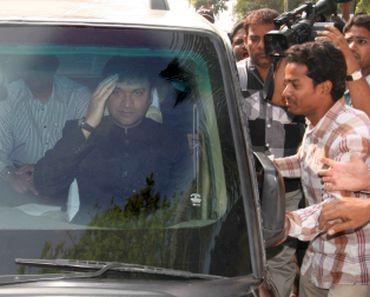
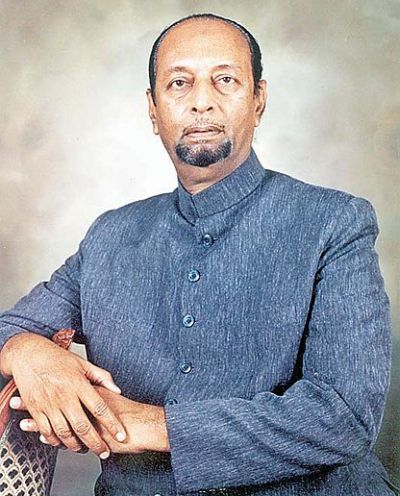
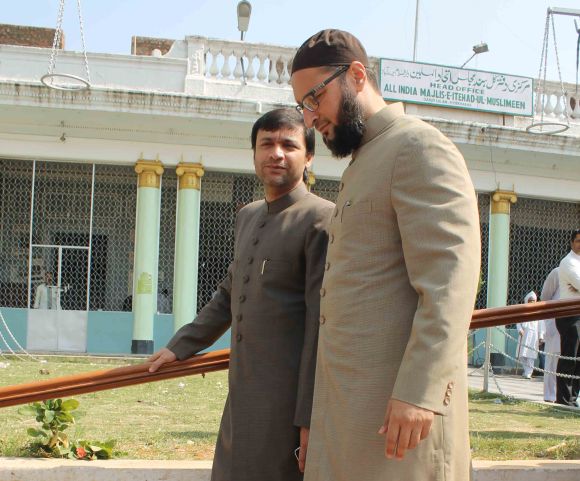
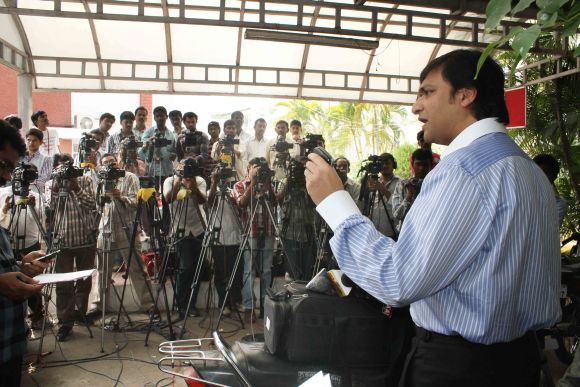
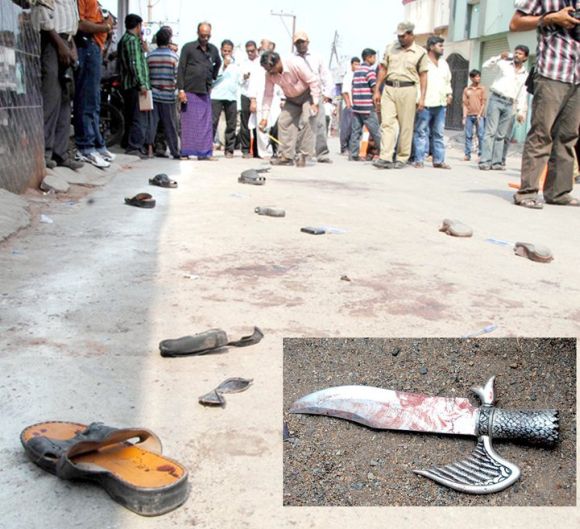
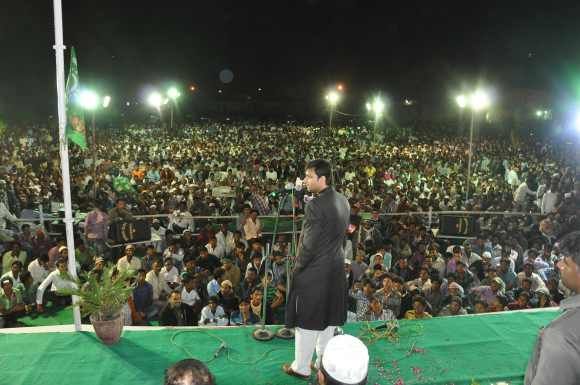
article